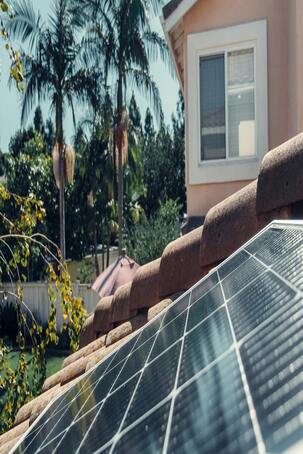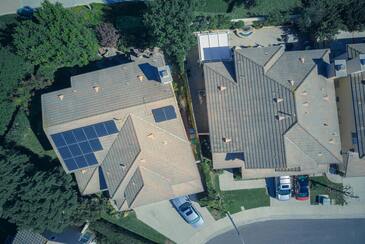Switching to renewable energy isn’t just a passing trend—it’s a smart move for a healthier planet and a better investment for your home. In Maryland and Washington, D.C., lots of homeowners are getting into solar panels. It’s not just about being green; it’s also about saving money and boosting your home’s value.
Are you thinking about going solar? Here’s a friendly guide to help you understand everything you need to know before transitioning:
 Your Roof’s Condition and Suitability
Your Roof’s Condition and Suitability
Before you go solar, you need a solid foundation — your roof. In Maryland and D.C., asphalt shingle roofs are common and generally provide a stable platform for solar panels. However, age and existing damage are critical factors to consider. Roofs that have missing or cracked shingles must be repaired or replaced to support the weight of solar panels and withstand potential wind forces. Consulting a qualified roofing professional is highly recommended to ensure a sturdy base for your investment.
Orientation is another key factor. Ideally, your roof should have a significant portion facing south to maximize sun exposure throughout the year. If this isn’t possible, east or west-facing installations can still be effective, particularly with modern, more efficient panels.
Sun Exposure and the Shadow Factor
The efficiency of your solar system hinges on the amount of direct sunlight your property receives. Obstacles like towering trees, neighboring buildings, or other structures that cast shadows can significantly reduce the power output of your panels. Many solar installers offer a sun path analysis, which meticulously maps the daily and seasonal movement of the sun across your property. This valuable tool helps identify potential shading issues and optimize the placement of panels for maximum sun exposure.
Maryland and D.C. experience distinct seasonal variations in sunlight. Accounting for these fluctuations is crucial when designing your system. Your solar installer should create a system that maintains efficiency throughout the year, ensuring that even during winter months with shorter days and lower sun angles, your solar panels continue to generate enough electricity for your energy needs.
Regulatory Landscape and Financial Incentives
The good news is that Maryland and D.C. are actively promoting solar energy adoption through various incentives that make solar power more accessible to homeowners. These incentives can include tax credits, rebates, and even grants that can substantially offset the initial cost of installation.
Additionally, exploring net metering policies in your area can further enhance your investment’s financial returns. Under net metering, your home becomes a mini power plant, allowing you to sell excess electricity you generate back to the grid, earning credits that can be applied to your future electricity bills.
Don’t forget to check with your local authorities regarding any zoning regulations or specific guidelines set by your homeowners’ association (HOA) that could impact your solar installation. Understanding the permitting process upfront can prevent delays and ensure your project complies with all necessary regulations.
 Ideal Solar System Capacity for Your Household Demands
Ideal Solar System Capacity for Your Household Demands
Ensure your solar system operates efficiently and meets your energy demands. The first step is to analyze your household’s energy consumption. Gather your past year’s electricity bills and calculate your average monthly and annual energy usage. This data will be invaluable for your solar installer when recommending the optimal number of panels and system size.
The goal is to strike a balance – a system large enough to meet your current needs with the potential for scalability to accommodate future increases in energy demand.
Think about your future energy needs too. Are you planning to buy an electric car or add a pool? A slightly bigger system now can save you the trouble of upgrading later.
Reliable Solar Partner: Expertise Matters
The installer you select heavily impacts your solar system’s long-term performance. Prioritize experienced companies with a proven track record in Maryland/D.C., proper certifications, and positive customer reviews. Look for transparency through the entire process – from design to installation to maintenance.
Don’t just take the first quote. Get detailed proposals from multiple vetted installers. Compare costs, warranties, service agreements, and equipment brands. A top installer will patiently address all your questions.
Doing thorough research on solar installers ensures you get a reliable, well-designed system tailored to your needs for decades.
Investing in solar panels is a win-win for your home, your money, and our planet! By following these tips and finding a great installer, you can harness the sun’s power and enjoy the satisfaction of generating clean, renewable energy for your home.
Imagine the feeling of using less traditional electricity and maybe even getting paid back for the extra power you produce!
Going solar might seem complicated, but with a little planning and the right guide, you can soak up the sun’s rays and contribute to a brighter future, one sunny day at a time.



 Ideal Solar System Capacity for Your Household Demands
Ideal Solar System Capacity for Your Household Demands

